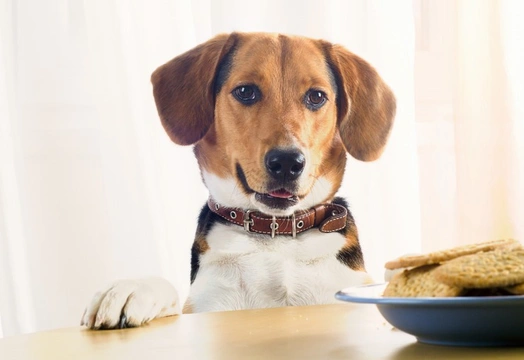
Why are dogs so food obsessed?
Unless you have instilled strict rules and boundaries regarding food into your dog’s lifestyle from an early age, the chances are that you unconsciously put a lot of effort into ensuring that your dog doesn’t have the opportunity to get hold of food that they’re not supposed to have.
Dogs are very opportunistic when it comes to finding something to eat, and even well-fed dogs that lack nothing will naturally seek out food whenever and wherever they can. This may manifest as begging for treats when you approach the kitchen, hovering by their bowls if you look in the cupboard that contains their food, begging for scraps if you are eating, and picking up food dropped on the floor, and out in the street too!
Some dogs will even go as far as jumping up at the table to steal food, attempt to take food from your hand, or march up to total strangers when out on walks in the hope of encouraging them to share their sandwich-all of which are very annoying traits that can be hard to manage.
Being obsessed with food to this level is how dogs behave naturally if they are not trained and restricted from doing so-and such behaviour can of course be dangerous for your dog, as well as apt to lead to obesity, annoyance and a lot of effort needed to stop your dog from eating too much, or things they should not have.
Many dog owners simply accept this as a fact of life when it comes to owning a dog, and understand that vigilance and proper management are essential to curbing such behaviours-but it is a good idea to develop a basic understanding of why dogs are so food obsessed, and how their history and evolution have led to this inherent canine trait.
In this article, we will examine why dogs are so food obsessed, and how this drive to eat at every opportunity played a part in canine evolution. Read on to learn more.
Wild dogs and canine evolution
Our domestic dogs today are far removed from their wild ancestors, which lived in roaming packs that moved around a large territory and worked as a team to provide for the needs of all of the pack members.
However, even though dogs have been domesticated for a very long time, the idea of pet dogs having all of their needs, including food, provided for them is a fairly modern development in canine history. Even within the last century or so, dogs that were owned would still have been expected in many cases to do some of their own food finding by hunting and scavenging.
In the wild, dogs get their food by a combination of hunting and scavenging, and while the drive to hunt is still strong in most domestic dogs, out of choice dogs would scavenge rather than actively work to hunt prey-after all, a free meal is always a bonus!
Because historically dogs were not fed regular meals and were responsible for providing for their own needs in terms of filling their tummies, hunting and scavenging for food would have taken up a lot of the average dog’s time, and a dog would never turn down food as a result, even if they were full up.
A regular and plentiful supply of food would be hard to find for a wild dog, particularly in the winter-and so if a dog found a source of food, they would be very reluctant not to make the best of it. This means that if a dog finds food even when they are full, they will still eat it, and/or attempt to save it for later, by dragging it back to their den or burying it.
This uncertainty about where their next meal would come from has led to the food-oriented behaviour that dogs display today-as a way to safeguard against hunger and lean times. Eating everything available when it is there would help the dog to build up fat stores for survival when there is less food around, and never missing the chance to top up harks back to times when a dog might find or catch a large meal, but then not be able to find food again for several days.
Even when a dog has never missed a meal in their life and has no personal history of going hungry, this evolutionary trait of opportunistic and proactive food seeking remains inherent to dogs, and is something that can only be curbed and managed with proper training and boundaries.
It is important to measure out your dog’s meals and not simply trust them to stop eating when they are full, because most dogs will not moderate their own food intake-and it is also important to train and condition your dog not to steal food from counters and plates, nor to eat food that they come across when out on walks, or that is dropped under the table.
This can of course be really challenging, and is harder in some breeds of dogs than others-the Labrador retriever, for instance, is one breed that is widely renowned for being harder to train out of scavenging than most. But starting young, and never failing to correct your dog when they overstep their boundaries, will all help-along with vigilance!



